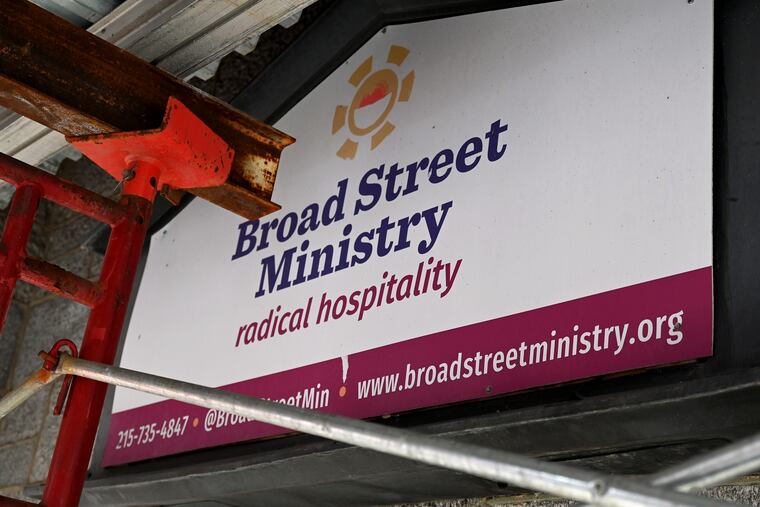Broad Street Ministry ends Sunday church service as congregation mourns loss of community
The Philadelphia nonprofit held its last regular church service on Sunday and plans to focus on its programs for people experiencing homelessness and financial hardship.

Broad Street Ministry, a Philadelphia nonprofit that offers a wide range of social services to those experiencing homelessness and financial hardship, will no longer host Sunday church services as it focuses on increasing direct pastoral care.
Laure Biron, who has worked for the nonprofit since 2019 and became CEO last year, said the difficult decision came after the ministry saw a near 30% increase in people who came to them for social services during the pandemic. Over the last two years, the ministry served more than 800,000 meals across the city.
“That care that increased over the period of the pandemic included a need for spiritual and emotional care,” she said, adding that spiritual care has only been available to guests on occasion through the congregation’s pastor.
Broad Street Ministry has never required guests to take part in spiritual offerings in order to access programs such as reentry services for those exiting prison, case management, or clothes mending. But with more guests asking for spiritual services, Biron said it made sense to hire a chaplain who would serve their religious needs while they’re already there for other programs. Ultimately, the guests will determine the direction of faith offerings.
The decision came as a surprise and devastated the “alternative church community,” which took over what was formerly known as Chambers-Wylie Memorial Presbyterian Church in 2005. A group of 50 to 100 members met for Sunday services there for 16 years. The social services that are pillars of Broad Street Ministry today were born out of the nondenominational congregation’s Sunday afternoon services, members say. They held their last service on Sunday.
John Francis O’Mara, a founding member of the church community and who later became an Episcopalian priest, said the space was different from most spiritual environments. The pews of the church had been ripped out, stained glass was shattered — meaning birds were often present during services — and the congregation sang a mix of Beyonce, Bruce Springstein, and the Grateful Dead.
Attendees included members of the LGBT+ community, atheists, and people looking for respite from the cold.
In its early years, Sunday services would be followed by a meal where people struggling financially were welcome, regardless of whether they attended the service.
“I learned pretty quickly at Broad Street Ministry that we were not a feeding program because feeding is what you do to cattle,” said O’Mara, who now lives in Wisconsin. “We were serving our guests, as individuals and citizens of our city… and so real plates with real China and ‘how are you this evening sir, can I seat you at your table?’”
Congregants called this approach “radical hospitality,” which allowed members to live the principles of their faith.
“They didn’t only preach the word but they acted it out,” said Brooke Stello, a church member for 12 years. “We’re not going to let people be hungry, because that’s not what we’re supposed to do.”
As the meal service grew and Broad Street Ministry added to its programming, “church” as members knew it became intertwined with their volunteer work.
“The faith community and the social services were all part of the same body,” said Kirsten King, who has been attending Sunday services since the congregation’s founding. “Those were synonymous with each other.”
The nonprofit now has about 25 staff members, and is governed by a board of directors.
King and others learned they would no longer be able to hold Sunday services at the church through an email sent in September. Biron and board chair Kevin Cafferky sent the email, which cited a focus on providing spiritual care to guests but offered few specifics about what that meant.
Biron said staffing Sunday services for the congregation required a full-time pastor, two pastoral supports, at least one worship leader, musicians, and a video editor for the services conducted virtually during the pandemic. While the part-time and contract positions were not a financial burden, according to Biron, they did require coordination the nonprofit could no longer sustain if its goal is to provide pastoral care to guests.
For Cara Blouin, a congregant for more than a decade, it’s unclear what losing access to Broad Street Ministry will mean for the group.
“You never saw such a bunch of weirdos, and we identified that way,” she said. “I think the thing that bound everybody together was the sense that like, most places won’t have me, but this one well.”
Some congregants are looking for a new space in an effort to continue their spiritual journey. Without an institution, members worry the community they built on service will lose the glue that held it together.
Commemorating the final service on Sunday, Blouin wrote out a poster that was taped to the front door.
“Atheists and punks and the worst saints and the best sinners sang together here,” it read. “We argued over the placement of bread baskets and the unclogging of toilets like the great moral questions of the age. …We were a mess. … We were here.”